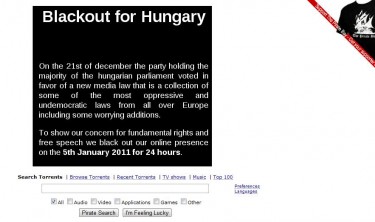The attention drawn to Hungary because of the new media law is still not decreasing. Citizens advocating freedom of speech are also trying to keep up the volume of the international coverage by means of communication on the internet. A group called Blackout for Hungary started a campaign for 24 hours beginning on Jan. 5 against the new media law introduced on Jan. 1. They stated in their manifesto:
On Dec. 21, the party holding the majority in the Hungarian parliament voted in favor of a new media law that is a collection of some of the most oppressive and undemocratic laws from all over Europe, including some worrying additions.
To show our concern for fundamental rights and free speech, we black out our profile pictures on Jan. 5, 2011, for 24 hours.
Blackout for Hungary promoted their start-up on Twitter under the hashtag #blackout4hungary and on a Twitter account as well.
A popular torrent site The Pirate Bay also showed they're supporting internet free speech in Hungary by swapping their logo with the ‘blackout’ profile picture. The Facebook event showed more than 2,000 followers of the campaign, many of them not Hungarian citizens.
Christopher Kullenberg, who is working on his Ph.D. at Gothenburg University and is the author of many studies on resistance in the age of the internet, published a post on his blog about the Blackout for Hungary campaign:
[…] The background for this action is a draconic new media law, which will introduce a special government agency that tracks down “politically unbalanced” reporting or things that goes against “common morals”. The agency will hand out costly fines to anyone not conforming to the government standards, fines that you must pay directly. This is a disaster for independent small-scale reporting and commentary. Basically, it tears down all the good things that the internet has given us. […]
Hungary holds the presidency of the EU since January the 1st. I think it’s necessary to put an end to this censorship madness. Not only for the solidarity of our Hungarian friends, but as a statement that we cannot tolerate such behaviour anywhere. […]
Webisztán, which is normally an internet- and technology-related blog, also reacted (HUN) to the new media law. An article at index.hu (HUN) reported that even if the Hungarian government denied criticism, “the scope of the law encompasses not only news sites but websites of private use as well, thereby putting regularly edited blogs operating in near-newspaper fashion – such as Mandiner or Véleményvezér – at risk of being subjected to the authority’s will.” András Koltay, a member of the media commission of the [Hungarian] National Media and Infocommunications Authority, told index.hu it couldn't be said yet which content had to be registered with the authority. The blogger of Webisztán commented on the article:
[…] I have no words for this. The age of never-ending political subjectivity and autocracy may come in content production under .hu. It may not be like this. But the possibility, it seems, will exist. If Webisztán was labeled a blog liable for registration by the venerated authority, I will put the kibosh on it. At least under .hu for sure. […]
The website szalaiannamaria.net, named after the iconic leader of the Authority, Annamária Szalai, directs to the Authority's website, but some weeks before a very insulting picture was the only thing that could be found there, along with these words: “Stay calm, guys. On a server abroad everything is possible.”
Dobray of Konzervatórium blog noted (HUN):
[…] The problem is not the law but the stance of Fidesz on the media: ‘we will show them.’ The creation of [the Authortity], filling it with Fidesz delegates, fixing it to its place, was really a blatant action. […]







